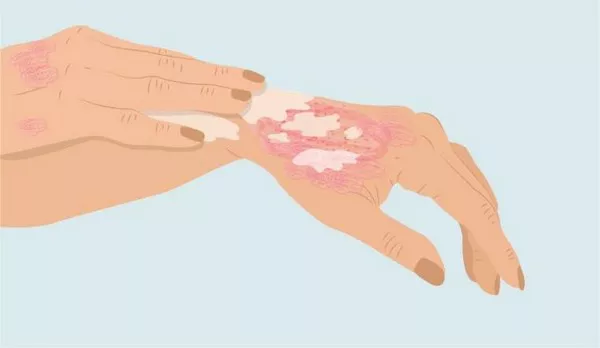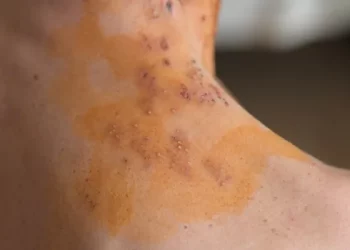Psoriatic arthritis (PsA) is a chronic inflammatory condition that affects both the skin and joints. It belongs to a group of diseases known as spondyloarthritis, which also includes ankylosing spondylitis and reactive arthritis. PsA can cause pain, stiffness, swelling, and joint damage, significantly impacting a person’s quality of life and mobility.
In this comprehensive article, we delve into the relationship between psoriatic arthritis and joint damage. We explore the mechanisms behind joint involvement, the progression of joint damage in PsA, factors influencing disease severity, available treatments, and strategies for managing joint health in individuals with psoriatic arthritis.
Understanding Psoriatic Arthritis
Psoriatic arthritis typically develops in individuals who already have psoriasis, a chronic skin condition characterized by red, scaly patches. However, not everyone with psoriasis will develop PsA, and the severity of skin involvement does not always correlate with joint symptoms.
Symptoms of Psoriatic Arthritis:
- Joint Pain and Stiffness: PsA commonly affects the joints of the fingers, toes, wrists, ankles, knees, and spine. Joint pain and stiffness are often worse in the morning or after periods of rest.
- Swelling and Inflammation: Inflamed joints may appear swollen, warm to the touch, and tender.
- Skin Changes: Some individuals with PsA may experience changes in the nails, such as pitting, ridges, or discoloration.
- Fatigue: Chronic inflammation and pain can lead to fatigue and decreased energy levels.
- Eye Inflammation: Uveitis, an inflammation of the middle layer of the eye, can occur in some individuals with PsA.
Psoriatic arthritis is a heterogeneous condition, meaning its presentation can vary widely among individuals. Some may have mild symptoms affecting only a few joints, while others may experience severe, progressive joint damage and disability.
Does Psoriatic Arthritis Cause Joint Damage?
Mechanisms of Joint Damage in Psoriatic Arthritis
Psoriatic arthritis is characterized by inflammation of the joints and surrounding tissues. Chronic inflammation leads to joint damage over time, primarily through several mechanisms:
1. Cartilage and Bone Destruction: Inflammation within the joint lining (synovium) can lead to the destruction of cartilage, which cushions the ends of bones and facilitates smooth joint movement. As cartilage breaks down, bones may rub against each other, causing further damage and erosion.
2. Bone Erosion: In addition to cartilage damage, chronic inflammation can directly affect the bones themselves, leading to bone erosion and deformities. This process is exacerbated by the release of enzymes and cytokines (proteins involved in inflammation) that promote bone resorption.
3. Joint Fusion (Ankylosis): In some cases, severe inflammation and damage can cause joints to fuse together, limiting mobility and function. This is more common in the spine (spondylitis) but can also occur in other joints affected by PsA.
Progression of Joint Damage
The progression of joint damage in PsA varies among individuals and depends on several factors, including:
- Disease Severity: Individuals with more severe PsA, characterized by higher levels of inflammation and widespread joint involvement, are at greater risk of developing progressive joint damage.
- Early Diagnosis and Treatment: Early diagnosis and aggressive treatment of PsA can help minimize inflammation and slow the progression of joint damage. Delayed diagnosis and inadequate treatment can lead to irreversible joint damage over time.
- Presence of Risk Factors: Certain risk factors, such as genetic predisposition, smoking, obesity, and concurrent conditions like metabolic syndrome, can influence the severity and progression of PsA.
Factors Influencing Disease Severity
Several factors can impact the severity and course of PsA, including:
- Genetics: Family history of psoriasis or PsA increases the risk of developing the condition.
- Immune System Dysregulation: PsA is characterized by immune system dysfunction, where the immune system attacks healthy tissues, including joints and skin.
- Environmental Triggers: Factors such as infections, stress, and injury may trigger or exacerbate PsA symptoms.
- Comorbidities: Conditions like obesity, cardiovascular disease, and metabolic syndrome are more prevalent in individuals with PsA and can worsen disease outcomes.
SEE ALSO: Is Psoriatic Arthritis a Chronic Disease?
Assessment and Monitoring of Joint Damage
Assessing joint damage in PsA involves a combination of clinical evaluation, imaging studies (such as X-rays and MRI scans), and patient-reported outcomes. The following are key considerations in assessing and monitoring joint damage:
- Physical Examination: Rheumatologists assess joint tenderness, swelling, range of motion, and signs of inflammation during routine clinical examinations.
- Imaging Studies: X-rays can reveal joint erosions, bone deformities, and changes in bone density over time. MRI scans provide detailed images of soft tissues and can detect early signs of inflammation not visible on X-rays.
- Patient-Reported Outcomes: Patient-reported outcomes, such as pain levels, functional impairment, and quality of life measures, provide valuable insights into the impact of PsA on daily activities and overall well-being.
Treatments for Psoriatic Arthritis and Joint Damage
The goals of treatment for PsA include reducing inflammation, relieving symptoms, preventing joint damage, and preserving joint function. Treatment strategies may include:
- Nonsteroidal Anti-Inflammatory Drugs (NSAIDs): NSAIDs help reduce pain and inflammation but do not prevent joint damage.
- Disease-Modifying Antirheumatic Drugs (DMARDs): DMARDs such as methotrexate, sulfasalazine, and leflunomide can slow disease progression by targeting immune system dysfunction.
- Biologic Therapies: Biologic medications, including TNF inhibitors (such as adalimumab and etanercept), IL-17 inhibitors (such as secukinumab), and IL-23 inhibitors (such as ustekinumab), target specific pathways involved in inflammation and have shown efficacy in reducing joint damage and improving symptoms.
- Steroid Injections: Intra-articular corticosteroid injections can provide targeted relief for inflamed joints, reducing pain and swelling.
- Physical Therapy: Physical therapy and exercise programs help improve joint flexibility, strength, and function, which can reduce the impact of joint damage on daily activities.
Lifestyle Modifications and Self-Care Strategies
In addition to medical treatments, lifestyle modifications and self-care strategies play a crucial role in managing PsA and minimizing joint damage:
- Maintain a Healthy Weight: Obesity can exacerbate inflammation and joint stress. Adopting a healthy diet and regular exercise can help manage weight and improve overall health.
- Protect Joints: Avoid repetitive movements that stress joints. Use assistive devices or ergonomic tools to reduce joint strain during daily activities.
- Manage Stress: Stress can worsen inflammation and trigger PsA flares. Practice stress-reduction techniques such as mindfulness, meditation, or yoga.
- Quit Smoking: Smoking can worsen inflammation and increase the risk of cardiovascular complications. Quitting smoking can improve overall health outcomes in individuals with PsA.
Monitoring and Long-Term Management
Psoriatic arthritis is a chronic condition that requires ongoing management and monitoring. Regular follow-up visits with a rheumatologist or healthcare provider are essential to assess disease activity, adjust treatment plans as needed, and monitor for potential complications, including joint damage.
Conclusion
Psoriatic arthritis can cause joint damage through chronic inflammation, leading to cartilage and bone destruction, bone erosion, and joint fusion over time. The severity and progression of joint damage in PsA vary among individuals and are influenced by factors such as disease severity, early diagnosis and treatment, genetic predisposition, and presence of comorbidities.
Effective management of PsA focuses on reducing inflammation, relieving symptoms, preventing joint damage, and preserving joint function. Treatments may include medications such as NSAIDs, DMARDs, biologic therapies, steroid injections, and physical therapy. Lifestyle modifications, including maintaining a healthy weight, protecting joints, managing stress, and quitting smoking, are integral to managing PsA and promoting overall well-being.
By understanding the mechanisms of joint damage in PsA and adopting a comprehensive approach to treatment and self-care, individuals with PsA can effectively manage their condition, minimize joint damage, and improve their quality of life over the long term. Early diagnosis, proactive management, and collaboration with healthcare providers are key to achieving optimal outcomes in Psoriatic arthritis management.
Related Topics:


























